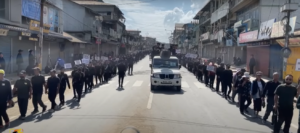Unau is your digital destination for celebrating the essence of brotherhood across the Kuki, Mizo, Zomi, and Hmar tribes.
In a candid interview conducted by Resonant News channel, retired Major Amit Bansal provided valuable insights into the intricate situation unfolding in Manipur. Maj. Bansal, a former Indian Army Major, emphasized the importance of dispelling false narratives that currently circulate, in order to gain a clearer understanding of the ongoing crisis in the region. He shed light on several crucial aspects during the interview that challenge prevailing misconceptions.
One of the central myths that has gained traction is the notion that the Kuki-Zo community were not original settlers of Manipur. Maj. Bansal swiftly debunked this misconception, highlighting historical records from the British era that affirm the presence of the Kuki-Zo community in Manipur and surrounding areas well before British arrival. He emphasized that during that time, the regions now encompassing Manipur, Nagaland, Myanmar, and other areas were all part of British India without the modern-day borders that exist today. The Kuki-Zo community’s territorial range extended from the Irrawaddy region through southern Manipur to Mizoram and even Chittagong in Bangladesh.
Maj. Bansal pointed to ancient monoliths erected by Kuki-Zo chiefs dating as far back as the 13th century in various villages. This historical evidence challenges the narrative that portrays the Kuki-Zo community as newcomers. He condemned the actions of the Meira Paibis, a women’s vigilante group, and highlighted videos online showing their involvement in escorting armed militants to attack Kuki-Zo villages.
The retired Major also touched upon the gruesome killing of David Thiek, where his decapitated head was displayed on a pole. He noted that even the violent imagery seen in Islamic State videos from the Middle East did not compare to such brutality.
Maj. Bansal delved into the differing responses of Manipur Police in situations involving violence. He described how, during the initial outbreak of violence in the Kuki-Zo village of Torbung, Manipur Police resorted to firing on the crowd, resulting in the deaths of 38 tribals, including women and children. In contrast, when a similar incident occurred in a Meitei village, the Manipur Police did not intervene to stop the violence but instead appeared complicit.
The Sugnu area witnessed a severe escalation of violence, with a large Meitei mob attacking around 40 Kuki-Zo villages in the vicinity. Manipur Police were present on the scene and actively participated by blocking roads and impeding outside intervention. When Assam Rifles personnel attempted to reach the area from Chandel to assist, the Manipur Police prevented their entry, leading to the complete destruction of the villages and the loss of many tribal lives.
The revelations from the interview conducted by Resonant News channel underscore the complexity and depth of the issues in Manipur. As the situation continues to unfold, it becomes increasingly important to rely on accurate information and perspectives to foster a better understanding of the underlying dynamics at play.








